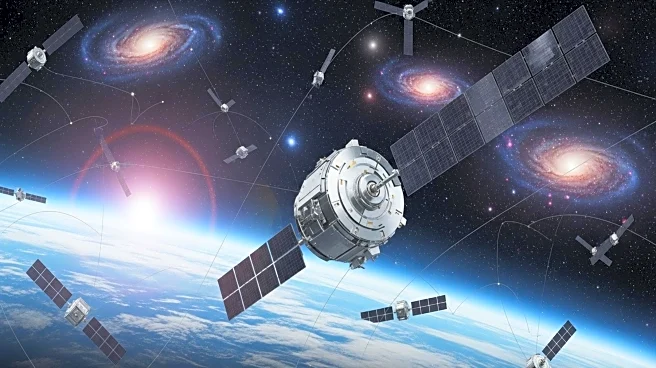What's Happening?
Novaspace has released a forecast predicting that 43,000 satellites will be launched between 2025 and 2034, a significant increase compared to the past decade. This surge is attributed to reduced launch costs, advancements in satellite technology, and geopolitical tensions, particularly between the U.S. and China. The report highlights that while defense-related satellites will constitute only 9% of the total, they will account for nearly half of the manufacturing and launch value. Megaconstellations, such as SpaceX's Starlink and Amazon's Project Kuiper, are expected to dominate the satellite landscape, comprising 66% of the launches. Despite their volume, these megaconstellations will only represent 11% of the market value, with larger, heavier satellites contributing more significantly to the sector's economic impact.
Why It's Important?
The anticipated increase in satellite launches underscores a transformative period in space utilization, driven by technological advancements and strategic defense needs. The U.S. and China are at the forefront of this expansion, with implications for global connectivity and national security. The defense sector's substantial investment in satellite technology reflects growing security concerns and the strategic importance of space in modern warfare. This trend could lead to increased competition and collaboration in the aerospace industry, influencing policy decisions and international relations. The economic impact is also significant, with the satellite industry poised to generate substantial revenue, particularly in downstream services like broadband internet.
What's Next?
As the satellite industry evolves, stakeholders can expect continued innovation and investment in satellite technology. Governments and private companies will likely increase their focus on developing more efficient and capable satellites to maintain competitive advantages. Regulatory frameworks may need to adapt to address the growing number of satellites and potential space debris issues. Additionally, the geopolitical landscape could shift as countries vie for dominance in space, potentially leading to new alliances and conflicts. The industry's growth will also necessitate advancements in ground infrastructure and data management to support the increased satellite activity.
Beyond the Headlines
The rapid expansion of satellite networks raises ethical and environmental concerns, particularly regarding space debris and the sustainability of space activities. As more satellites are launched, the risk of collisions and the creation of space junk increases, posing challenges for long-term space exploration and utilization. Furthermore, the concentration of satellite technology in the hands of a few major players could lead to issues of access and equity, with implications for global digital divides. These factors highlight the need for international cooperation and regulation to ensure the responsible use of space.











